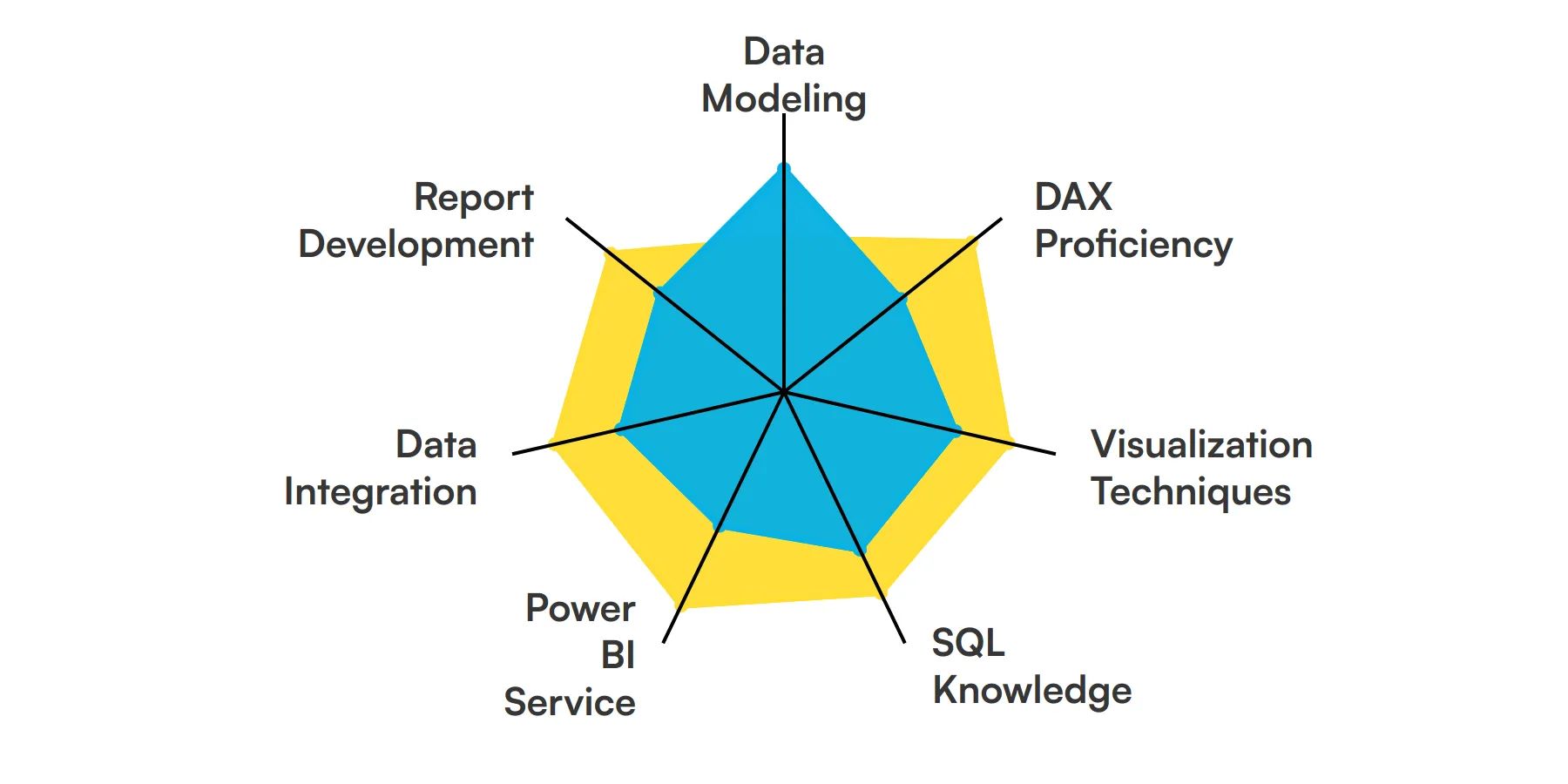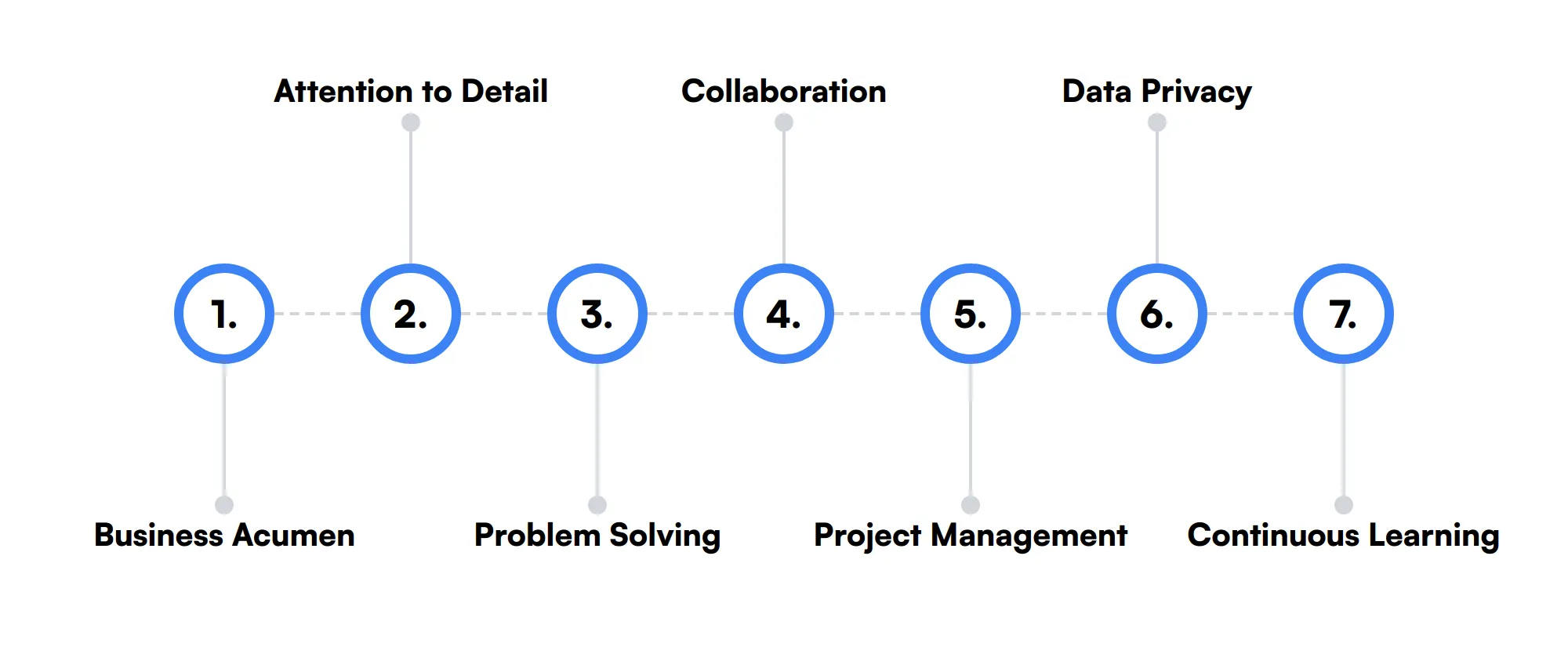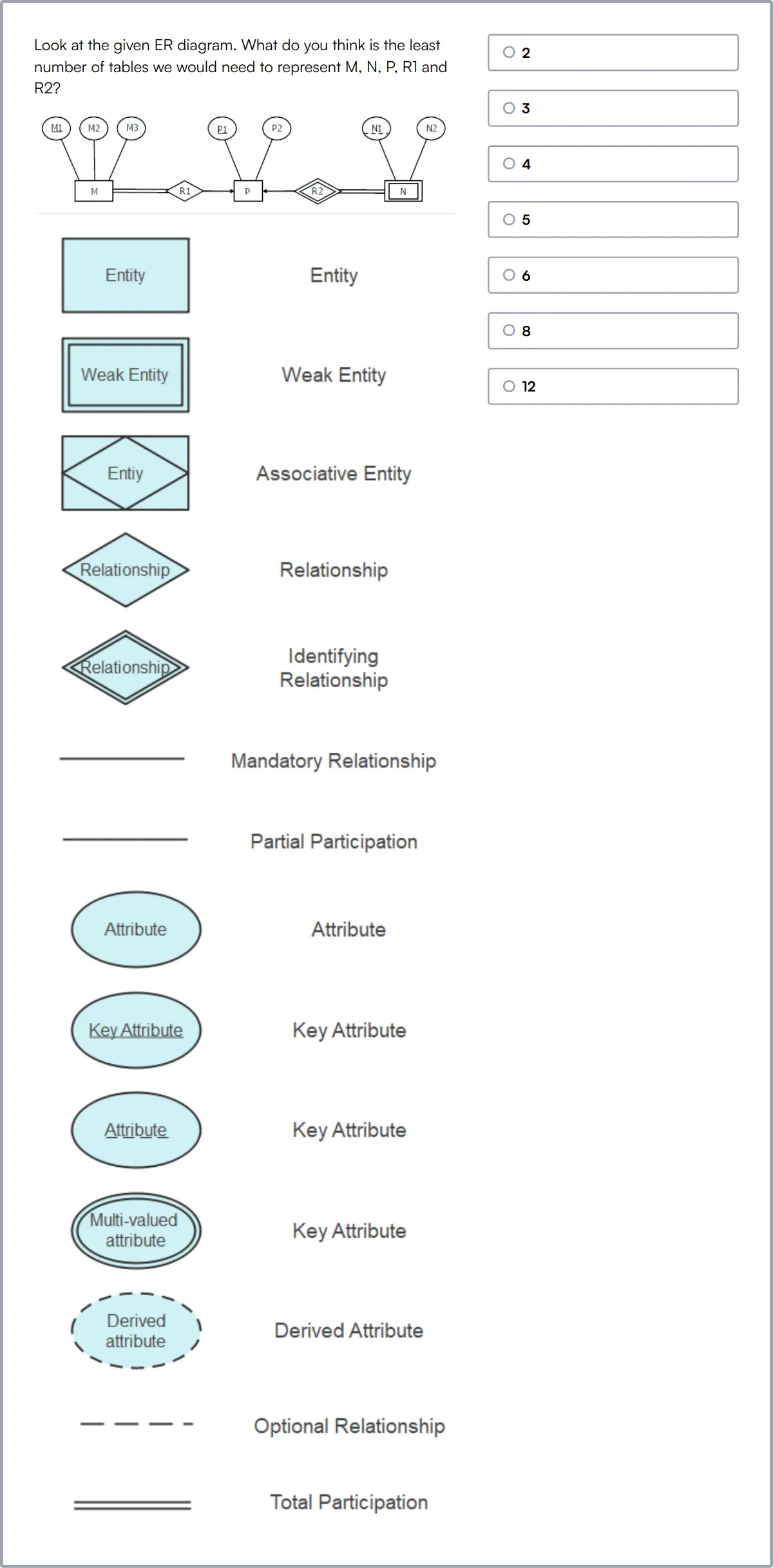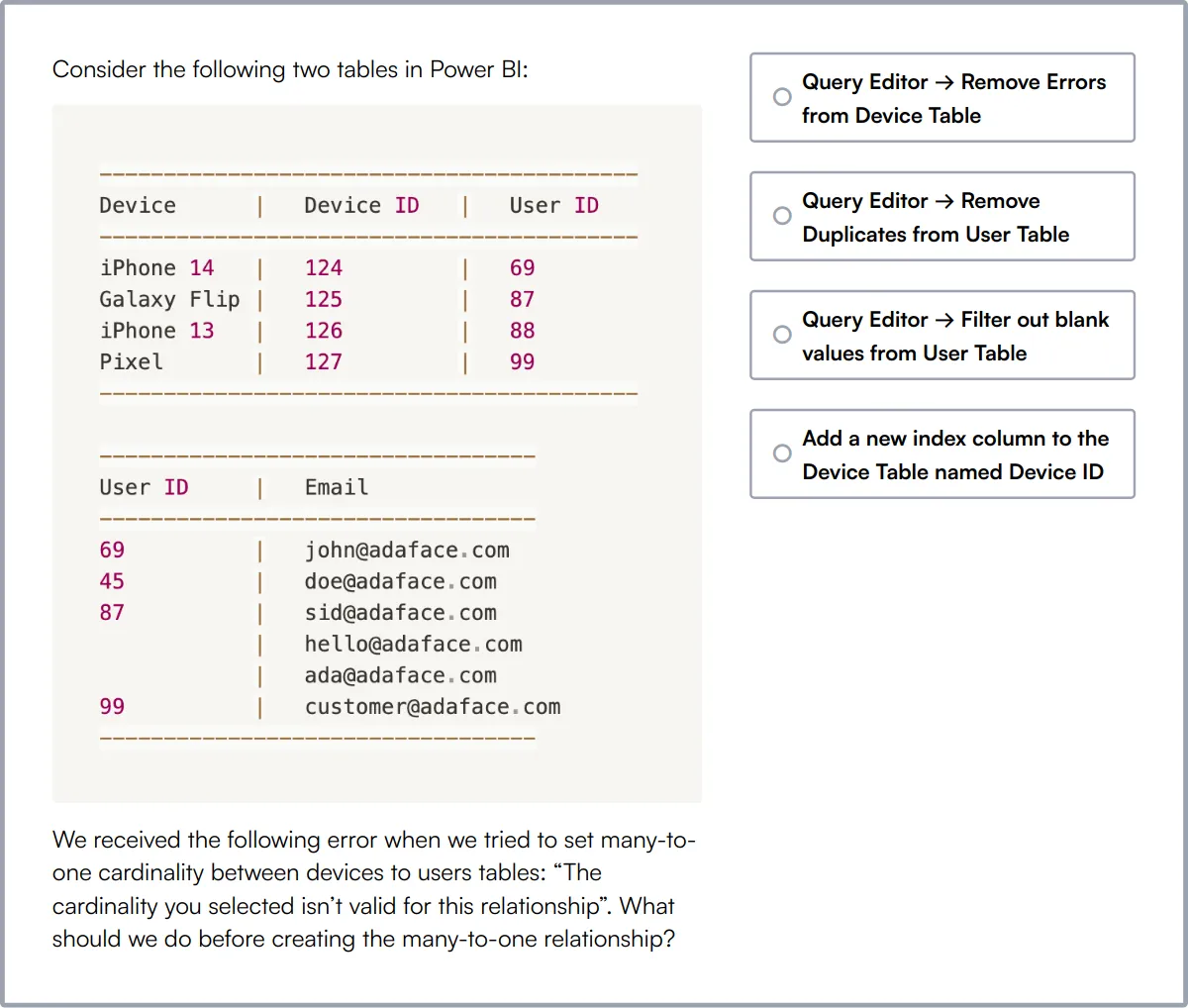Power BI professionals are instrumental in transforming raw data into compelling visual insights. They bridge the gap between data and decision-making, enabling organizations to understand complex information quickly and effectively.
Skills required for a Power BI role include proficiency in data modeling, expertise in DAX (Data Analysis Expressions), and a strong understanding of Power BI service. Additionally, analytical thinking and effective communication are important for success in this field.
Candidates can write these abilities in their resumes, but you can’t verify them without on-the-job Power BI skill tests.
In this post, we will explore 7 essential Power BI skills, 7 secondary skills and how to assess them so you can make informed hiring decisions.
Table of contents
7 fundamental Power BI skills and traits
The best skills for Power BIs include Data Modeling, DAX Proficiency, Visualization Techniques, SQL Knowledge, Power BI Service, Data Integration and Report Development.
Let’s dive into the details by examining the 7 essential skills of a Power BI.

Data Modeling
Data modeling involves creating a visual representation of a system or data. In Power BI, this skill is used to structure and relate different data sources effectively, ensuring that the reports and dashboards are built on a solid foundation of accurately linked data.
For more insights, check out our guide to writing a Data Modeler Job Description.
DAX Proficiency
DAX (Data Analysis Expressions) is a formula language used in Power BI to perform calculations. Mastery of DAX is crucial for a Power BI professional as it allows for the creation of complex calculations and adds analytical depth to reports, enhancing decision-making processes.
Visualization Techniques
Creating compelling visualizations is key to effectively communicating data insights. Power BI professionals use this skill to design dashboards that are not only informative but also intuitive, helping stakeholders quickly understand the data and make informed decisions.
Check out our guide for a comprehensive list of interview questions.
SQL Knowledge
SQL skills are necessary for querying databases to retrieve the data needed for analysis in Power BI. Understanding SQL allows the user to efficiently extract and manipulate data, ensuring that the insights derived are based on the most relevant and up-to-date information.
Power BI Service
Using Power BI Service is essential for publishing reports and setting up dashboards that are accessible on the cloud. This skill ensures that a Power BI professional can share insights with stakeholders anywhere and anytime, facilitating a dynamic and responsive data-driven culture.
For more insights, check out our guide to writing a Power BI Job description.
Data Integration
Data integration involves combining data from different sources into a coherent store. A Power BI professional uses this skill to ensure that the data used in reports is comprehensive and consolidated, providing a holistic view of the business landscape.
Report Development
Developing detailed and accurate reports is a fundamental skill for a Power BI professional. This involves not only the technical creation of reports but also understanding what insights are valuable to end-users, tailoring reports to meet those needs effectively.
Check out our guide for a comprehensive list of interview questions.
7 secondary Power BI skills and traits
The best skills for Power BIs include Business Acumen, Attention to Detail, Problem Solving, Collaboration, Project Management, Data Privacy and Continuous Learning.
Let’s dive into the details by examining the 7 secondary skills of a Power BI.

Business Acumen
Understanding business operations and industry specifics can greatly enhance the relevance and impact of data analysis performed using Power BI.
Attention to Detail
Ensuring accuracy in data analysis and report generation is critical, as even minor errors can lead to incorrect business decisions.
Problem Solving
Identifying and addressing issues in data or report structures quickly is important for maintaining the integrity of business insights.
Collaboration
Working with various stakeholders to gather requirements and feedback is essential for creating effective Power BI reports and dashboards.
Project Management
Managing timelines and deliverables for Power BI projects ensures that business needs are met promptly and efficiently.
Data Privacy
Understanding and applying data privacy principles is crucial to comply with legal standards and maintain stakeholder trust.
Continuous Learning
The field of data analytics is ever-evolving, and staying updated with the latest Power BI features and data trends is necessary for ongoing professional development.
How to assess Power BI skills and traits
Assessing Power BI skills involves more than just glancing at a resume; it requires a deep dive into the candidate's abilities in Data Modeling, DAX Proficiency, Visualization Techniques, SQL Knowledge, Power BI Service, Data Integration, and Report Development. These skills are integral to mastering Power BI and ensuring that your team can handle complex data challenges effectively.
Traditional interviews might not fully reveal a candidate's proficiency in these areas. This is where practical assessments come into play. By using tailored tests, you can measure a candidate's real-world skills and their ability to perform under job-like conditions. For instance, Adaface assessments offer a practical approach to evaluating these competencies, ensuring that you can identify candidates who are truly proficient in Power BI. Learn more about Adaface assessments here.
Incorporating these assessments into your hiring process can lead to a 2x improvement in the quality of your hires and significantly streamline your screening process, reducing time spent by up to 85%. This method not only enhances the efficiency of your hiring process but also ensures that you onboard individuals who are well-equipped to contribute to your organization's data-driven goals.
Let’s look at how to assess Power BI skills with these 4 talent assessments.
Data Modeling Skills Test
Data Modeling Skills Test evaluates a candidate's knowledge and abilities in database design, SQL, ER diagrams, normalization, relational schema, data integrity, data mapping, data validation, and data transformation.
The test assesses their understanding of data modeling, database design, SQL, and ER diagrams. Candidates will navigate through scenarios involving data integrity, data mapping, and data transformation.
Successful candidates demonstrate proficiency in creating and managing relational schemas, ensuring data integrity, and performing data validation and transformation tasks.

Power BI Online Test
Power BI Online Test evaluates a candidate's ability to build data models, select and execute appropriate visualizations, create dashboards to explore data and answer queries, publish and share insightful reports, and run analytics using DAX language in Power BI.
The test covers skills such as connecting to data sources, data wrangling and transformations, DAX formulas, and interactive reports. Candidates will also be assessed on their ability to publish and share reports using Power BI Desktop.
High-scoring candidates show proficiency in creating comprehensive data models, utilizing DAX for analytics, and effectively sharing insights through interactive reports and dashboards.

SQL Online Test
SQL Online Test evaluates a candidate's ability to design and build relational databases and tables from scratch, apply CRUD options, write efficient queries and subqueries to filter data, and create efficient indexes for faster SQL queries.
The test assesses their understanding of creating databases and tables, CRUD operations, joins and subqueries, and indexes. Candidates will also be tested on conditional expressions, views, and transactions.
Successful candidates demonstrate strong skills in database creation, data manipulation, and query optimization, ensuring robust and scalable database solutions.

Data Analysis Test
Data Analysis Test assesses a candidate's ability to handle, modify, analyze, and interpret data. The test uses scenario-based MCQ questions to screen for experience with analyzing data to find possible outcomes, detect anomalies, extract meaningful insights, project estimates, and visualize data using charts and graphs.
The test covers skills such as data modeling basics, data analysis fundamentals, business analysis, and data interpretation. Candidates will also be assessed on their ability to perform data queries and use popular data tools like Excel.
High-scoring candidates show proficiency in analyzing data, detecting anomalies, and visualizing insights effectively, making them valuable assets for data-driven decision-making.
Summary: The 7 key Power BI skills and how to test for them
| Power BI skill | How to assess them |
|---|---|
| 1. Data Modeling | Evaluate the ability to design and structure data for analysis. |
| 2. DAX Proficiency | Test skills in writing and optimizing DAX formulas for calculations. |
| 3. Visualization Techniques | Assess the creation of clear, insightful, and interactive visual reports. |
| 4. SQL Knowledge | Measure proficiency in querying and managing databases using SQL. |
| 5. Power BI Service | Check understanding of deploying and managing reports on Power BI Service. |
| 6. Data Integration | Evaluate the ability to connect and integrate various data sources. |
| 7. Report Development | Assess skills in designing and developing comprehensive Power BI reports. |
BI Developer Test
Power BI skills FAQs
What is data modeling in Power BI and why is it important?
Data modeling in Power BI involves structuring data sources into a coherent model. It helps in creating relationships between different data sets, which is essential for accurate reporting and analysis.
How can I assess a candidate's DAX proficiency?
You can assess DAX proficiency by giving practical tasks that require writing DAX formulas. Look for their ability to create calculated columns, measures, and use functions like CALCULATE, FILTER, and SUMX.
What visualization techniques should a Power BI expert know?
A Power BI expert should know how to use various visualizations like bar charts, line charts, scatter plots, and custom visuals. They should also understand how to use slicers and filters effectively.
Why is SQL knowledge important for a Power BI role?
SQL knowledge is important because it allows the candidate to query databases directly, extract data, and perform data transformations before importing it into Power BI.
What is the Power BI Service and how is it used?
Power BI Service is a cloud-based platform for sharing, collaborating, and publishing Power BI reports and dashboards. It allows users to access reports from anywhere and collaborate in real-time.
How can I evaluate a candidate's business acumen in a Power BI role?
Evaluate their ability to understand business requirements, translate them into technical specifications, and create reports that provide actionable insights. Ask for examples of past projects.
What role does attention to detail play in Power BI report development?
Attention to detail ensures that reports are accurate, visually appealing, and free of errors. It involves checking data accuracy, formatting consistency, and ensuring that visualizations convey the right message.
How can continuous learning benefit a Power BI professional?
Continuous learning helps Power BI professionals stay updated with new features, best practices, and industry trends. It ensures they can leverage the latest tools and techniques to improve their work.
Assess and hire the best Power BIs with Adaface
Assessing and finding the best Power BI is quick and easy when you use talent assessments. You can check out our product tour, sign up for our free plan to see talent assessments in action or view the demo here:

40 min skill tests.
No trick questions.
Accurate shortlisting.
We make it easy for you to find the best candidates in your pipeline with a 40 min skills test.
Try for freeRelated posts
Free resources



